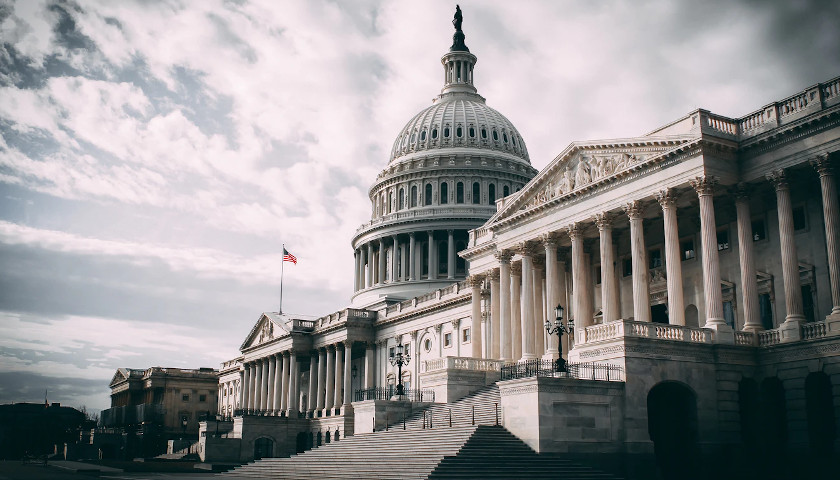by Ronald J. Pestritto
The principles and policies of America’s original progressives have received renewed attention over the last decade, both in academia and in public discourse. Today’s progressive politicians and intellectuals have pointed to their roots in the original progressive movement; moreover, the connections between the original progressive calls for reform and the language and shape of our politics today have become increasingly obvious. In what follows, the relevance of original progressivism to government today will be more fully explored. There is no better place to begin than with our administrative state. This essay deals with the general principles of the administrative state and its roots in the original progressive movement.
Origins
The term “administrative state” has come to have a variety of meanings, but at its core it points to the situation in contemporary American government, created largely although not entirely by Franklin Roosevelt’s New Deal, whereby a large, unelected bureaucracy is empowered with significant governing authority. The fundamental question for many of those making reference to an “administrative state” is how it can be squared with government by consent and with the constitutional separation-of-powers system.
Nominally, the agencies comprising the bureaucracy reside within the executive branch, but their powers transcend the traditional boundaries of executive power to include both legislative and judicial functions; these powers are often exercised in a manner largely independent of presidential control and of political control altogether. Given the vast array of activities in which the national government has involved itself in the post-New Deal era, the political branches of government have come to rely heavily on the expertise of bureaucratic agencies, often ceding to them significant responsibility to set, execute, and adjudicate national policy. The major policy debates during the current and most recent presidential administrations show that the administrative state is of the utmost relevance: with President Obama’s healthcare and environmental initiatives, or with President Trump’s immigration initiatives, to name just a few of the most obvious examples, debates have centered around the extent to which agencies have authority to make and carry out policy in the absence of clear legislative warrant. As the constitutional branch tasked with making law, Congress has increasingly ceded this responsibility, the administrative state has stepped into the gap.
The difficulty with this state of affairs is that the administrative state coexists uneasily and often incoherently with the principles of constitutional government upon which the nation was founded and under which, at least in form, it continues to operate. This is by no means a novel observation; within the literature on constitutional and administrative law, many on both the Right and the Left have pointed to such a development. This state of affairs is also evident from the tortured logic of federal court opinions, as judges must regularly bow to the reality of the administrative state while doing so within the formal framework of a legal or constitutional order that seems to provide little place for that reality.
These facts show us why the administrative state is bound up with the rise of progressivism, since the ideas of the progressives formed a foundation in the American political tradition for moving away from the principles and political science of the founding. My aim, therefore, is to examine the political ideas that gave rise to the contemporary situation in administrative law and policy making, and especially to uncover the foundations of these ideas in the political thought of the Progressive Era. Some introduction, however, to the current situation and its relationship to the principles of original constitutionalism is in order, and will show how the growth of the modern administrative state is tied to the movement in the United States from the old liberalism to the new.
The founders’ principal aim was to protect individual natural rights in a democratic system of government, and they did so through the political science of the Constitution. Federalism and the separation of powers were the two primary organizational features of this political science. Both features were predicated, at least partly, on the notion that dividing power made it more likely it would be exercised in a rational manner more conducive to the securing of rights. In the case of separation of powers, the legitimate authority of the union would be exercised by three co-equal departments of government, each making sure that the others remained within the confines of their proper constitutional places. The fundamental aim of the separation of powers, which, as the fathers of progressive liberalism correctly understood, came not only from Locke’s Second Treatise but more directly from Montesquieu’s Spirit of the Laws, was to safeguard rights against the possibility of arbitrary government. Madison in Federalist 47, echoing Thomas Jefferson, redefined “tyranny” to mean the absence in government of the separation of powers.
It is from this fundamental aim of separation of powers that we can discern three important tenets of American constitutionalism that bear directly on the administrative state, although this is by no means an exhaustive list.
The first is the principle of non-delegation. If the separation of powers means anything at all, it means that one branch of government may not permit its powers to be substantially exercised by another branch.
The second tenet is a corollary of the first: there may be no combination of functions within a single branch. As Madison, quoting Jefferson in the passage from Federalist 47 mentioned above, elaborates: “The accumulation of all powers legislative, executive and judiciary in the same hands . . . may justly be pronounced the very definition of tyranny.” Under this second tenet of the separation of powers, those making the law would also have to be subject to its being enforced upon them by an independent authority; those involved in execution could not make up the law as they went along, but would instead have to enforce laws that had been previously established by a separate authority; and those on whom the law was enforced could have their cases judged by an authority entirely separate from that which had brought prosecution.
The third tenet of the separation of powers is the responsibility of administration to the republican executive. The government remains “wholly popular,” in the words of Federalist 14, because those who carry out the law (administrators, under the traditional meaning of the term) are directly answerable to the president, who is elected. The Constitution grants all of “the executive power” to the president and requires him to “take care that the laws be faithfully executed.” Administration—as vigorous as some of the founders surely envisioned it—was thereby placed wholly within a single branch of government, and a clear line of political accountability for administrators was established.
For the American pioneers in progressive liberalism, this older, limited understanding of government stood in the way of the policy aims they believed the state ought to pursue in a world that had undergone significant evolution since the time of the founding. At the most fundamental level, therefore, the separation of powers was a deadly obstacle to the new liberalism, since it was an institutional system intended to keep the national government directed toward the relatively limited ends enumerated in the Constitution and the Declaration of Independence.
Beyond this fundamental difference, the three tenets of the separation of powers mentioned above posed a particular problem for the progressives’ vision for national administration at the outset of the 20th century. The range of activities they wanted the government to regulate was far too broad for Congress to handle under the original vision of legislative power. Instead, to varying degrees, the fathers of progressive liberalism envisioned a congressional delegation of regulatory power to an enlarged national administrative apparatus, which would be much more capable of managing the intricacies of a modern, complex economy because of its expertise and its ability to specialize. And because of the complexities involved with regulating a modern economy, it would be much more efficient for a single agency, with its expertise, to be made responsible within its area of competence for setting specific policies, investigating violations of those policies, and adjudicating disputes.
The fulfillment of progressivism’s administrative vision, therefore, required the evisceration of the non-delegation doctrine and the adoption of a combination of functions as an operating principle for administrative agencies. Furthermore, the progressives believed that administrative agencies would never be up to the mission they had in mind if those agencies remained subservient to national political institutions. Since modern regulation was to be based upon expertise—which was, its founders argued, objective and politically neutral—administrators should be freed from political influence. Thus the constitutional placement of administration within the executive and under the control of the president was a problem, as the progressives looked to insulate administrators not only from the chief executive but from politics altogether.
Expediency Over Principle
The acquiescence in the realms of law, politics, and culture to the concepts of delegation, combination of functions, and insulating administration from political control is explained by what legal scholars call the victory of “functionalism” over “formalism, or what political theorists might loosely translate as “pragmatism” over “originalism.” Simply defined, a functionalist or pragmatic approach begins not with the forms of the Constitution, but with the necessities of the current age, thereby freeing government from the restraints of the Constitution so that the exigencies of today can be met.
As Peter L. Strauss argues, “Respect for ‘framers’ intent’ is only workable in the context of the actual present, and may require some selectivity in just what it is we choose to respect.” This sentiment elevating expedience and efficiency over the separation of powers was expressed very clearly by Justice Blackmun in his opinion for the Court in Mistretta v. United States (1989): “Our jurisprudence has been driven by a practical understanding that in our increasingly complex society, replete with ever changing and more technical problems, Congress simply cannot do its job absent an ability to delegate power under broad general directives.” The rise of the administrative state that is such an integral feature of progressive liberalism thus required the defeat of the separation of powers as a governing principle, at least as it was originally understood, and its replacement by a system that allows delegations of power, combination of functions, and the insulation of administration from the full measure of political control.
In actual practice, the biggest steps toward defeating separation-of-powers constitutionalism took place during the New Deal, which was animated by a strong optimism about the capabilities, public spiritedness, and objectivity of administrators. This optimism reflected the progressive political theory that had come at least a generation earlier; it was a manifestation of the idea of separating politics and administration, originated in America by Woodrow Wilson and Frank Goodnow—two of the founders of the administrative state as it exists today. Wilson introduced the concept of separating politics and administration—of treating administrative governance as an object of study entirely separate from politics—in a series of essays in the latter part of the 1880s. Goodnow expanded upon this Wilsonian concept in the 1890s, and eventually published a book in 1900 titled Politics and Administration. Goodnow is often given more credit today for his role in the origins of administrative law, both because his seminal writings on the topic were more voluminous than Wilson’s and because administrative law was the field in which Goodnow worked and published for decades.
Why Trust Administrators?
The key to trusting administrators with the kind of discretion that Goodnow envisioned was his profound faith in the expertness and objectivity of the administrative class—just as it had been for Wilson and would be for James Landis. Administrators could be freed from political control because they were “neutral”—their salaries and tenures would take care of any self-interested inclinations that might corrupt their decision making, liberating them to focus solely on truth and the good of the public as a whole.
As Goodnow explained, “such a force should be free from the influence of politics because of the fact that their mission is the exercise of foresight and discretion, the pursuit of truth, the gathering of information,the maintenance of a strictly impartial attitude toward the individuals with whom they have dealings, and the provision of the most efficient possible administrative organization.” A natural objection here would be that freeing administrators from political control is a recipe for corruption—that it is precisely through the electoral connection of public officials that we “make their interest coincide with their duty,” as Hamilton puts it in The Federalist. But for Goodnow, it is just this connection to electoral politics that would make administrators corrupt, while the absence of accountability to the electorate somehow makes them pure. Politics, Goodnow explained, is “polluted” and full of “bias,” whereas administration is all about the “truth.”
Goodnow’s confidence in the objectivity of administrators, like Wilson’s, is a sign of his Hegelianism, and it shows that he accepted Hegel’s premise that bureaucrats could be freed of their particularity, and will only the objective good of the state. In his introduction to the recent edition of Politics and Administration, bureaucracy scholar John A. Rohr even concludes that Goodnow’s “Hegelian starting point” doomed his attempt at crafting a realistic administrative reform. Goodnow himself worried, in 1900, that the emphasis in American political culture on popular sovereignty and individual rights would pose a formidable obstacle to the enactment of his vision for administration. The people, given their historical background, might resist deferring to a permanent, administrative class:
When we take into account on the one hand the environment in which men lived in this country prior to the middle of the nineteenth century, and on the other hand the prevailing political philosophy with its emphasis on individual liberty, and popular sovereignty, and its abhorrence of a permanent governing class, we can well understand the development of the idea which was so commonly held that rotation in office was a cardinal doctrine in American government.
Goodnow also worried that this public hostility to “experts” would make it hard to attract talented individuals into the bureaucracy, although he subsequently consoled himself with the possibility that change was on the horizon. In 1916, Goodnow hoped he was seeing a change in attitude, where the people were becoming less attached to their sovereignty so that experts could be allowed to rule:
Generally speaking, however, the power of the people to elect directly public officers is diminishing. The change is not, however, as has been pointed out, due to any decrease in the belief in the general theory of popular sovereignty. The people through the referendum and initiative are exercising greater power than ever over the determination of questions of policy. They have, however, in the interest of efficient government, been willing to surrender powers of choosing public officers which they at one time regarded with great jealousy.
The New Progressive Constitution
Today’s administrative state is built on the death of the non-delegation doctrine. It is on the basis of abandoning non-delegation that administration can be separated from politics—that administrators can act, in other words, with discretion as they employ their expertise free from political influence. Constitutional and administrative law today really do not concern themselves with whether or not administrative agencies can have such discretion delegated to them, or whether or not they may exercise legislative and judicial powers in addition to their executive powers. Instead, the law assumes these things to be entirely legitimate, and concerns itself with the questions of how, and to what extent, such discretion can be exercised.
Thus the entire enterprise of the modern administrative state owes its existence to the abandonment of separation of powers as an operative constitutional principle, and its replacement by a system separating politics and administration. While such a separation was relied upon by the likes of Landis to build up the administrative state, it originated in the Progressive Era, in the work of Wilson and Goodnow.
Goodnow seems to have built on Wilson’s basic principles, and made a very significant contribution by his unique argument on the role of the courts. In particular, Goodnow’s use of judicial independence to make the case for administrative independence was unprecedented in progressive thought. And it is why we have in Goodnow’s thought the two pillars of today’s liberal state: unelected judges who make law through constitutional interpretation, and unelected bureaucrats to whom significant policy making power is delegated on the basis of their expertise.
Modern administrative law largely focuses on sorting out power between judges and agency administrators. Understanding how that plays out goes a long way towards grasping how policy is really made today in American government. And it rests on a set of critical legal doctrines that have been established in the judiciary since the New Deal.
– – –
Ronald J. Pestritto is a writer for American Greatness.
Photo “Frank Johnson Goodnow” by Marceau.








